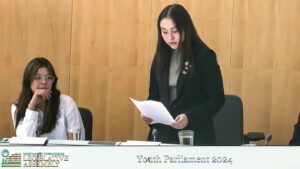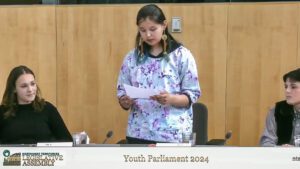Nineteen youth took over the NWT Legislative Assembly last week. No, it was not a protest.
The annual Youth Parliament attracted grade 9 and 10 students from the 19 ridings across the territory for several days of acting the role of an MLA and learning about the workings of the Assembly and the NWT’s Consensus Government.
Some main themes emerged: More housing and to repair the current public housing stock; more resources for the vulnerable populations of all ages; more activities for youth; improvements to highways; protecting caribou; more mental health supports; and dealing with climate change.
There were also some hyper-local Yellowknife issues, such as ice-ruts on streets and the lack of shoreline access.
Miley Wolki is a Grade 10 student from Tuktoyaktuk and represented the riding of Nunakput.

Grade 10 student from Tuktoyaktuk Miley Wolki represented the riding of Nunakput. (Image from Assembly livestream)
The 16 year old used her member’s statement to explain the need of a permanent mental health treatment center.
“I rise today to speak up about the urgent need for mental for mental health facility in Tuktoyaktuk. For many months we had suffered the losses of our loved ones due to poor mental health.
“As I’ve witnessed and experienced mental health isn’t something to be taken lightly. And losing someone you care about is absolutely terrible. Getting help and support in my community can be impossible, especially when everything seems hopeless.
“When you’re too afraid of speaking up. By setting up a permanent mental health treatment center in Tuktoyaktuk. You show, my people, my community there’s a promise for better tomorrow. My deepest condolences go out to all the families who are affected by suicide.”
CKLB spoke with Miley during a break in the session and learned there is one counsellor in the community.
She was asked why she decided to discuss mental health.
Miley: “Well, personally, I think that a lot of the youth are stressed. And another personal thing. I have had loved ones who are going through stuff. So, it just hurts. So, I guess I wanted to make sure they feel heard.”
CKLB: “How are you managing to stay away from all that stuff? How do you how do you make a difference in your own life?”
Miley: “Well, I don’t try to think about what other people think of me. It’s I say it’s basically it doesn’t matter it only if you stay true to yourself that that’s what matters. I do go through some mental health stuff, like, tired throughout the day or something like that. But um, yeah, that’s how I that’s how I deal with it.”
CKLB: “Just healthier sort of choices and you don’t you don’t get influenced by the bad crowd.”
Miley: “That kind of like I try to”
CKLB: “That’s good. That’s good. Nobody’s Perfect, right?”
Miley: The only thing you could ever do in life is try and if you don’t do your best, it’s okay. Because other people make mistakes as well.”
Community well-being was also on the mind of Sydney McLeod for her member’s statement. The Grade 9 student from Aklavik representing the Mackenzie Delta riding.

Grade 9 student Sydney McLeod from Aklavik, representing the Mackenzie Delta riding. (Image from Assembly livestream)
“Today I would like to talk about getting an all-season road for Aklavik. During the start of the winter. The Aklavik winter ice road forms, but every year it starts form later and later due to climate change,” stated the 15 year old.
“So, when the ice road takes longer to form, it takes longer for the stores to receive groceries and other essential items. During freeze up, the stores get shipments by planes, which is limited due to weather and availability.
“Furthermore, once the warm weather starts it starts to melt the snow creating overflow on the ice road in an earlier road closure. When the ice road is closed on the way in and out of a classic is by plane until it’s open water season, when you can travel by boat.
“The airline that flies to Aklavik only offers passenger services when ice road is closed for the season. Even then it’s hard to get in and out of Aklavik due to limited planes or seats they offer and weather also plays a factor of flights. In the past few years the cost of a plane ticket has been going up in price with no end in sight.”
During the week of Youth Parliament, students research community concerns, meet with their MLA to talk about the issues, write a member’s statement representing their riding, learn how a bill becomes a law, hold a mock session, and ask questions during question period.
Noticeably absent was much discussion over the economy or jobs. Either private or public-sector.
But the traditional economy was mentioned once or twice, with more fish harvesting from Great Slave Lake being encouraged to diminish poverty issues due to high food prices
The idea of investing more in educational fishing programs and the agriculture industry so that the people have the skills necessary to play their part in acting against poverty.

Nineteen youth took over the NWT Legislative Assembly in Yellowknife last week for the 2024 Youth Parliament. (James O’Connor/CKLB)





